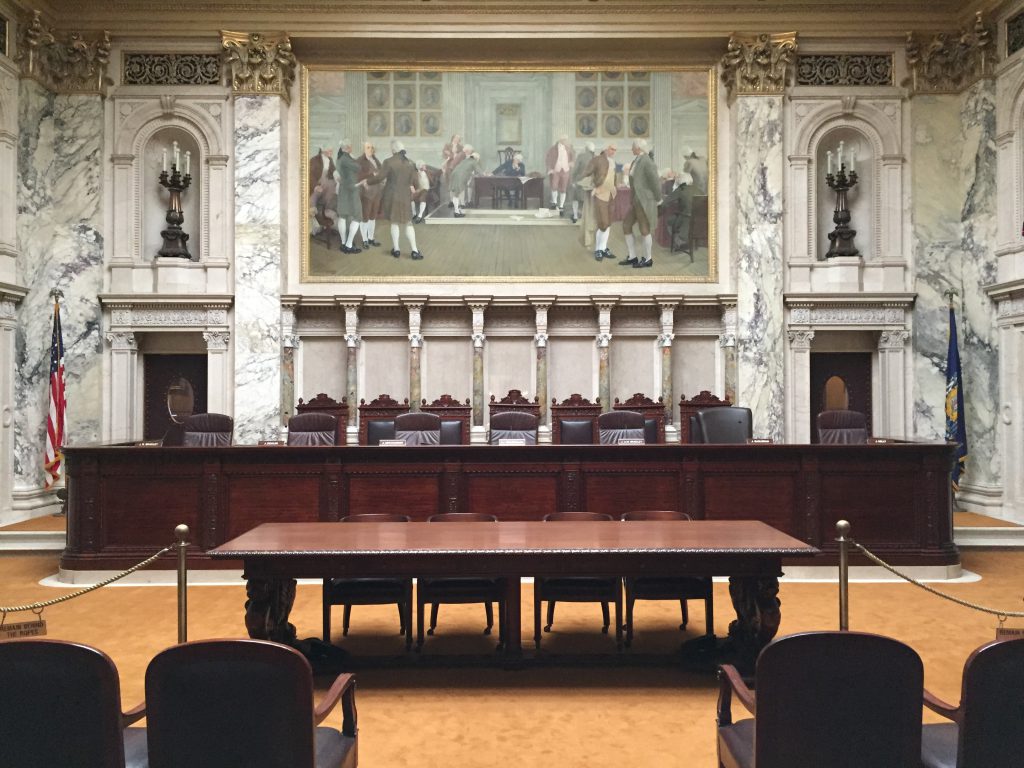An Uphill Fight for ‘Lame Duck’ Challengers?
Wisconsin’s history shows legislative sessions are legal and necessary -- and the courts have backed them.
For almost four decades, Wisconsin legislators – Democrats and Republicans – have brought themselves back to the Capitol for “extraordinary” sessions to act on issues big and small.
Examples of bills passed in extraordinary sessions:
The aid package that built Fiserv Arena, home of the Milwaukee (“Fear the Deer”) Bucks. Spending bills. New legislative district lines. A right-to-work law. Ratification of dozens of negotiated contracts with state employee unions.
Records show a 2004 extraordinary session acted on 153 items; a similar session in November 2015, 118 items, and in April 1998, 100 items.
Widespread acceptance of extraordinary sessions as part of the legislative process is a big reason why the League of Women Voters (LWV), other groups and Gov. Tony Evers who are challenging what passed in the December extraordinary session face an uphill fight.
Consider how Justice Rebecca Grassl Bradley, during oral arguments in the case last week, greeted the attorney for groups arguing that everything legislators did in that “lame duck” session should be voided.
“You are asking this court to rule that the Wisconsin Legislature has been acting unconstitutionally for four decades? How can that be?” Grassl Bradley said, adding:
“Don’t you find it extraordinary that nobody raised this issue before this court for four decades?”
Undeterred, LWV attorney Jeff Mandell insisted that almost four decades of past, unchallenged actions in extraordinary sessions doesn’t make them legal.
Instead, Mandell said the Wisconsin Constitution stipulates that legislators set a formal calendar for the Legislature to act, or the governor can call a special legislative session, but there is no implied or explicit authority for “extraordinary” sessions.
The fact that legislators for years have been playing “fast and loose” with the Constitution doesn’t make it right, Mandell said.
When lawmakers ended their regular session in March 2018, they could not legally return for what amounts to an illegal “perpetual” session in December, Mandell added.
LWV, unions, other groups and Evers want to void the Legislature’s December acts that limited the powers of the governor and attorney general and approved 82 final appointments made by outgoing Republican Gov. Scott Walker.
Although lower courts ruled that all or parts of those December acts and appointments were illegal, the Supreme Court quickly took over the cases. It is expected to rule on the case within weeks.
The case poses historical separation of powers issues, since the judicial branch will have the final say in a dispute between the executive branch that Evers leads and the Republican-controlled legislative branch.
Grassl Bradley wasn’t the only justice casting doubt on Mandell’s arguments, however.
“The Constitution says [the Legislature] shall meet ‘as provided by law’,” noted Justice Daniel Kelly.
“That allows the Legislature and the governor to decide when and how, and how often, it’s going to meet,” Kelly added. “If they decide they are going to meet for two years at a time…The statute allows for that.”
No, Mandell said, if the Legislature wants to meet in an “extraordinary” session, it must pass a law expressly allowing it to do so. But it hasn’t passed that law, he added.
Justice Rebecca Dallet noted that simply passing that law legalizing extraordinary sessions would resolve the controversy.
Representing Evers, attorney Tamara Packard said authors of the State Constitution in 1848 intended to “limit where, when a how the Legislature could meet …[to] safeguard liberty.”
But Chief Justice Pat Roggensack also sharply questioned Mandell’s interpretations of the Constitution and laws. “I don’t understand you, either,” she told him at one point.
Attorney Misha Tseytlin, solicitor general in the state Justice Department under former Atty. Gen. Brad Schimel, said legislators have used extraordinary sessions to deal with emergencies.
“Sometimes, new needs do arise,” Tseytlin said, adding:
“Sometimes, the Milwaukee Bucks threaten to leave town and the Legislature has got to come back in and fund and authorize an arena so the Milwaukee Bucks don’t move out of state.
“That’s exactly why the Legislature doesn’t dissolve itself at the end of a prescheduled floor period.”
In a recent WisconsinEye interview, former Republican Gov. Tommy Thompson, who served for 20 years in the Assembly, and former Democratic Assembly Speaker Tom Loftus, the longest-serving Democratic speaker, agreed on one thing: Extraordinary legislative sessions are legal, and necessary.
Steven Walters is a senior producer with the nonprofit public affairs channel WisconsinEye. Contact him at stevenscotwalters@gmail.com
More about the Lame Duck Laws
- Supreme Court Hears Case on Legislature’s Power - Sarah Lehr - Apr 3rd, 2025
- Four Years Later, State’s Lame Duck Law Still Faces Court Challenge - Shawn Johnson - Jan 17th, 2023
- Judge Rules Against Law Giving Legislators Power Over Attorney General Settlements - Shawn Johnson - May 11th, 2022
- State Supreme Court Dismisses AG’s Lame-Duck Lawsuit - Ruth Conniff - Mar 25th, 2021
- Kaul Sues Legislature Over Lame Duck Laws - Melanie Conklin - Nov 24th, 2020
- AG Kaul Announces Legal Action to Allow DOJ to Again Enforce Wisconsin Laws Without Unconstitutional Legislative Interference - Josh Kaul - Nov 23rd, 2020
- Vos Thinks Lame-Duck Session Didn’t Go Far Enough - Melanie Conklin - Jul 31st, 2020
- The State of Politics: Court Rulings Against Evers Sow Confusion - Steven Walters - Jul 20th, 2020
- Court Tosses Dems’ Lame-Duck Suit - Laurel White - Jul 16th, 2020
- Op Ed: State High Court Nullifies 2018 Election - James Rowen - Jul 12th, 2020
Read more about Lame Duck Laws here
The State of Politics
-
RNC Brings Fame to Gen Z Party Leader
 Jul 15th, 2024 by Steven Walters
Jul 15th, 2024 by Steven Walters
-
Wisconsin’s Republican Roots Run Deep
 Jul 8th, 2024 by Steven Walters
Jul 8th, 2024 by Steven Walters
-
Feuding Supreme Court Justices Need a Break
 Jul 1st, 2024 by Steven Walters
Jul 1st, 2024 by Steven Walters






















